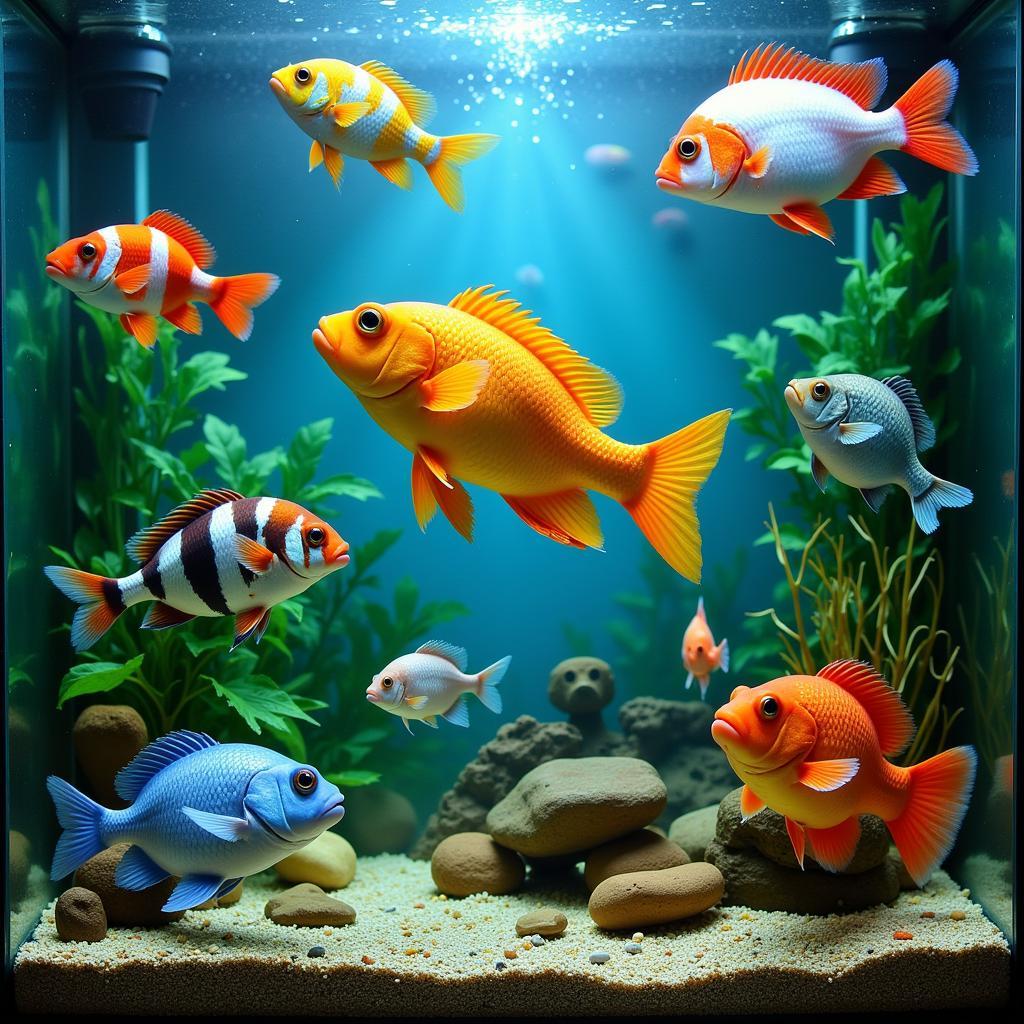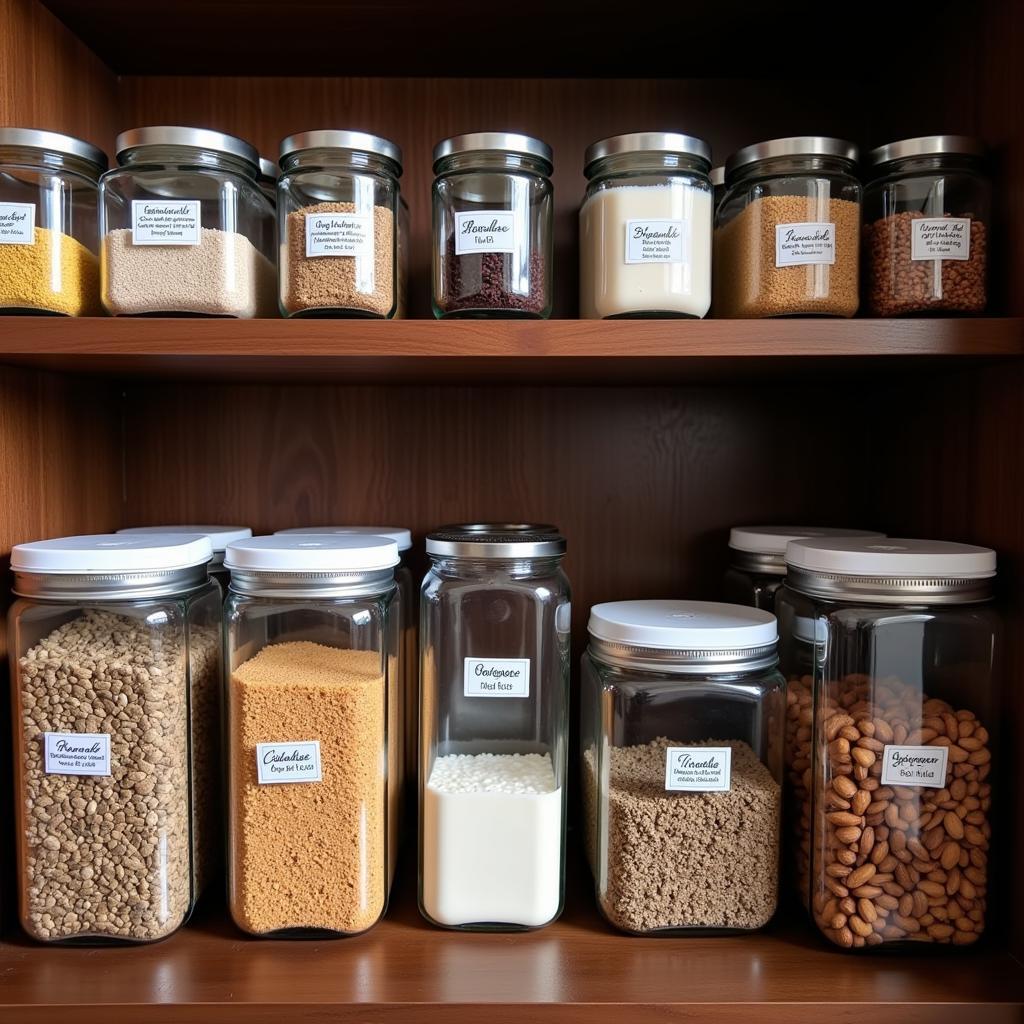So, you’ve got fish. You love your aquatic friends, and you want to make sure they’re getting the best nutrition possible. That’s where buying fish food in bulk comes in. Whether you’re a seasoned aquarist with a multi-tank setup or just starting out with a single betta, buying your fish food in bulk can save you time, money, and unnecessary trips to the pet store.
Why Buy Fish Food Bulk?
There are several compelling reasons to consider buying your fish food in larger quantities:
- Cost Savings: Buying in bulk often translates to a lower price per unit, saving you money in the long run, especially if you have a lot of fishy mouths to feed.
- Convenience: Less frequent trips to the store means more time to enjoy your aquarium and less time running errands.
- Freshness: While fish food has a long shelf life, buying in bulk allows you to control storage conditions and ensure your fish are always getting the freshest food possible.
Choosing the Right Fish Food in Bulk
Before you fill your cart with the first jumbo-sized fish food container you see, it’s crucial to choose the right type of food for your finned friends.
Factors to Consider:
- Species: Different fish species have different dietary needs. Herbivores like mollies need plant-based foods, while carnivores like bettas thrive on protein-rich options.
- Age and Size: Just like puppies and kittens need specialized food, young and growing fish often require diets higher in protein and certain nutrients.
- Feeding Habits: Consider whether your fish primarily feed at the surface, middle, or bottom of the tank. This will determine the ideal form of food, whether it’s flakes, pellets, or wafers.
 Different fish species with varying dietary needs.
Different fish species with varying dietary needs.
Navigating the World of Bulk Fish Food Options
Walk into any well-stocked pet store, and you’ll be met with a dizzying array of fish food choices. Here’s a breakdown of common types of fish food available in bulk:
- Flakes: A classic choice, flakes are affordable and widely available. However, they tend to break down quickly in water, which can cloud your tank.
- Pellets: These come in various sizes and formulations to suit different fish species. They hold their shape better than flakes and sink more readily, making them a good option for bottom feeders.
- Wafers: Designed to sink slowly, wafers are ideal for bottom-feeding species like catfish and loaches.
- Freeze-Dried and Frozen Foods: These offer a highly nutritious and palatable treat for your fish. You can find everything from brine shrimp to bloodworms, often in bulk packages.
Expert Tip from Dr. Sarah Jones, Aquatic Veterinarian: “Always research the specific dietary needs of your fish species before buying food in bulk. A balanced diet is crucial for their health, immunity, and longevity.”
Storing Bulk Fish Food for Optimal Freshness
Proper storage is key to maintaining the nutritional value of your fish food and preventing spoilage:
- Airtight Containers: Transfer your bulk fish food from bags to airtight containers to keep it fresh and protected from moisture, pests, and light.
- Cool, Dark Place: Store the containers in a cool, dark, and dry place, such as a pantry or cupboard, to prevent nutrient degradation caused by heat and light exposure.
- First In, First Out: If you purchase multiple containers, use the oldest one first to ensure you’re always feeding your fish the freshest food possible.
 Proper storage methods for bulk fish food.
Proper storage methods for bulk fish food.
Fish Food Bulk FAQs
Here are answers to some commonly asked questions about buying fish food in bulk:
Q: How much fish food should I buy in bulk?
A: Consider your fish’s feeding needs, the food’s shelf life, and your storage capacity. It’s better to buy a smaller quantity more frequently if you’re unsure.
Q: Can I mix different brands or types of fish food?
A: While it’s generally best to stick with one type of food, you can gradually introduce new foods or offer a variety of treats to provide a more diverse diet.
Q: How can I tell if my bulk fish food has gone bad?
A: Spoiled fish food may have an off smell, discoloration, mold growth, or a change in texture. Discard any food that appears to be spoiled.
Don’t Forget the Treats!
While a high-quality staple diet is essential, don’t be afraid to spoil your fish with the occasional treat. Chub dog food, for example, is a great option for occasional treats.
Expert Insight from Mark Peterson, Aquarium Hobbyist: “I’ve found that buying my fish food in bulk not only saves me money but also allows me to experiment with different brands and varieties to find what my fish enjoy the most.”
Conclusion
Buying fish food in bulk is a smart choice for aquarists of all levels. By carefully considering your fish’s needs, choosing the right type of food, and storing it properly, you can ensure your aquatic companions receive the nourishment they need to thrive.
Need help choosing the right fish food bulk for your finned friends? Contact us at Phone Number: 02437655121, Email: minacones@gmail.com, or visit us at 3PGH+8R9, ĐT70A, thôn Trung, Bắc Từ Liêm, Hà Nội, Việt Nam. We have a dedicated customer support team available 24/7.